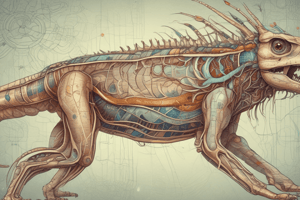Podcast
Questions and Answers
What does the August Krogh Principle suggest?
What does the August Krogh Principle suggest?
What is the importance of maintaining homeostasis?
What is the importance of maintaining homeostasis?
Which statement best describes the zone of stability?
Which statement best describes the zone of stability?
Why is multicellularity considered beneficial for animals?
Why is multicellularity considered beneficial for animals?
Signup and view all the answers
What is a significant distinction between sexual and asexual reproduction in animals?
What is a significant distinction between sexual and asexual reproduction in animals?
Signup and view all the answers
Study Notes
Animal Physiology
- Animal physiology studies how animals function, integrating organs, tissues, cells, and molecules.
- Physiology is rooted in natural philosophy.
Aristotle
- Lived 384-322 BCE.
- Classified organisms based on if they had blood or not.
- Noted the relationship between structure and function.
- Speculated about body function.
Erasistratus
- Lived 304-250 BCE.
- Considered a father of physiology.
- Suggested that the heart was a pump and identified the tricuspid valve.
Galen
- Lived 129-216 CE.
- One of the most accomplished physiologists of antiquity, using experimental methods like tying nerves or ureters to observe function and its results.
- Experiments examined kidney function and the relationship between nerves and larynx function.
- Described heart anatomy and the properties of blood flow.
- Described pulmonary circulation.
Ibn al-Nafis
- Lived 1213-1288 CE.
- Described the pulmonary circulation.
- Corrected some of Galen's incorrect ideas about the heart and blood flow.
- First to accurately identify the circulation through the lungs and beyond.
William Harvey
- Lived 1578-1657 CE.
- Provided complete description of the circulatory system and the properties of blood.
- Demonstrated that the heart acted as a pump that circulated blood.
- Speculated about the existence of capillaries.
Antoine Lavoisier
- Lived 1743-1794 CE.
- Discovered and identified the roles of oxygen in combustion and aerobic metabolism.
Claude Bernard
- Lived 1813-1878 CE.
- First to utilize "blind" experiments for objectivity in research
- Discovered that hemoglobin carries oxygen.
- Described that the stability of the internal environment (despite variable external environment) is the condition for the free and independent life.
- Coined "milieu interieur" (internal environment).
Walter Cannon
- Lived 1871-1945 CE.
- Coined "fight-or-flight response."
- Defined homeostasis as maintaining a stable internal environment.
- Described the body's response to thirst (dry mouth hypothesis).
August Krogh Principle
- For every biological problem, there's an animal on which it can be conveniently studied.
- Use of specific animals helped unlock principles of physiological function, like the mechanisms of breathing and adapting to low oxygen environments.
Multicellular Organisms:
- Complexity and specialization in multicellular organisms are due to multiple types of cells, tissues, and organs organized into systems.
- Animals regulate their internal environment (homeostasis) in response to changes in the external environment.
Homeostasis:
- Regulation of the internal environment to maintain stability in the face of external fluctuations and changes.
- Maintaining suitable levels of oxygen, nutrients, temperature, and pH balance, amongst other things, for the body to function correctly.
Scaling Relationships:
- Even if the volume or length of an organism increases linearly, the surface area and metabolic demands do not.
- Surface area is a factor in how much heat an organism loses and how much it takes in, as it's related to the volume, and this scales differently.
Choanoflagellates:
- Closest living relatives to animals.
- Exist in solitary or small colony forms.
- Found in harsh environments.
Asexual vs. Sexual Reproduction
- Asexual reproduction creates clones of the parent.
- Sexual reproduction combines genetic material from two parents creating diverse offspring.
Animal Body Size and Temperature:
- Body size and temperature directly affect almost all physiological functions.
- Temperature and size regulate how much heat is generated and lost, which ultimately affect the metabolic rate of the organism.
Studying That Suits You
Use AI to generate personalized quizzes and flashcards to suit your learning preferences.
Related Documents
Description
Explore the fundamentals of animal physiology, including contributions from key historical figures like Aristotle, Erasistratus, Galen, and Ibn al-Nafis. This quiz covers the integration of bodily functions, the development of physiological concepts, and the evolution of understanding in the field of physiology through the ages.




